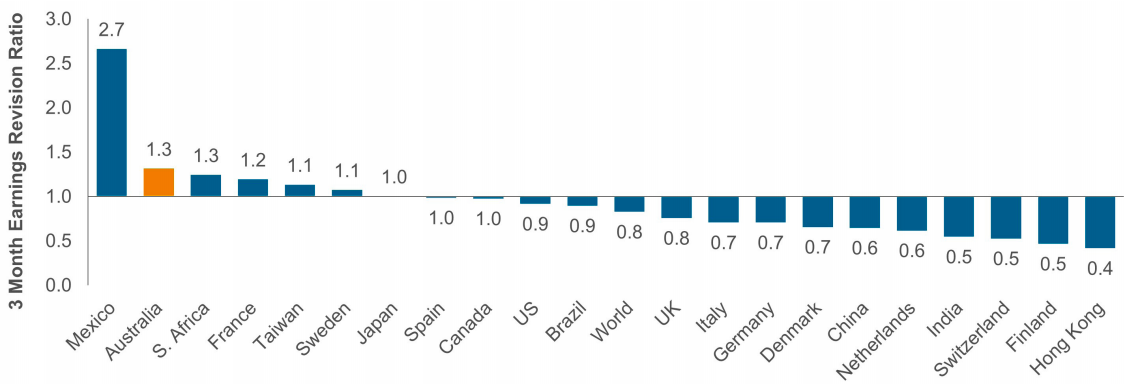These stocks will lead us out of bear territory
Australian equities in relative terms have outperformed other stock markets by a significant margin in the recent global correction. This is largely due to the greater resilience of consensus Australian earnings estimates thanks to Australia’s exposure to resources. This development is unsurprising, given the fact that a global interest rate upcycle is now underway.
As 2022 unfolds, we believe the market will likely worry more about a global activity slowdown than inflation and interest rates. Growth stocks have struggled year to date, but as the year unfolds and recession fears multiply, value stocks are likely to feel the most pressure.
For the second half, we expect quality growth stocks to perform better in the face of a continuing earnings slide. Recently we have taken the opportunity to add to growth companies that we believe had become oversold based on inflation fears and higher projected interest rates.
Key insights:
- We have increased our exposure to defensive growth, such as consumer staples and health care, funded from the more cyclical parts of the market.
- We think it is better to prepare for slowing growth and rising recession risk in 2023 rather than dwell on what stares us in the face today (higher inflation).
Investors to focus more on earnings
As 2022 unfolds, we believe the market is likely to worry more about a slowdown in global activity and thus increased earnings risk than about inflation and interest rates.

Although low in absolute terms, Figure 3 shows that Australian equities in relative terms have outperformed other stock markets by a significant margin in the recent global correction. This is largely due to the greater resilience of consensus Australian earnings estimates, as shown in Figure 4, largely thanks to Australia’s exposure to resources.
For the majority of countries, the 3-month EPS revision ratio is negative.
The EPS ratio measures the number of stocks for which consensus EPS estimate has risen in Forecast Year 1 and Forecast Year 2, versus the number of stocks for which it has fallen.
This development is unsurprising, given the fact that a global interest rate upcycle is now underway. We believe that we are only in the early stages of a global earnings downgrade cycle, which is expected to intensify as recession fears increase.

As 2022 progresses, the market will come to worry more about slowing growth than about inflation, and thus perceptions of earnings risk will likely increase.
Australia's earnings revision ratio has so far held up much better than elsewhere thanks to its higher market weights for energy and commodities. Still positive 3-month earnings revisions have largely been driven by the resources sector, by miners, oil and gas.
As global activity slows, earnings revisions for Australia are also expected to turn negative, as cyclical areas like consumer discretionary and media come under greater pressure in the second half of 2022.
However, as a 'value' market with roughly 50% of market cap in value sectors like banks, miners and energy,
Australia may continue to show some outperformance in relative terms, as earnings revisions deteriorate at an even faster pace in other markets.
Normally, we would see risks building for commodity prices as the world economy enters a slower growth environment in 2H 2022, particularly as China's short-term economic outlook has dimmed due to the lockdowns mandated by Beijing's adherence to a strict zero-COVID policy. However, the global slowdown in 2023 may be unusual in that Australia's key commodity prices may remain relatively well supported.
The disruption caused by the west's sanctions on Russia are expected to intensify as Europe strives to phase out purchases of Russian oil and gas by year end, opening up the possibility of secondary sanctions on countries that since February have increased purchases of heavily discounted Russian oil (India and China).
With OPEC so far refusing to increase output quotas, high energy prices, including coal, may persist into 2023. And China has not downgraded its 5.5% growth target for 2022, in which case it may double down on fiscal stimulus via infrastructure spending after the omicron wave has ended, aiming for a rapid rebound in economic activity in 2H.
In that case, we might expect the price of iron ore – the single most important commodity price for Australia's terms of trade – to remain firm.
Market outlook for 2H and 2023
In the recent global market correction, the U.S. fell by almost 19%, a similar decline to that of the MSCI AC World global stock index.
On a relative valuation basis, the ASX 200 currently looks cheap. As a result, global money managers have been directing more money toward the Australian stock market.
Australia's cheapness partly reflects its composition and the greater share of value sectors in the index. It also reflects the fact that the RBA was less enamored with QE (quantitative easing) policies after the global financial crisis and more recently in response to the coronavirus pandemic than either the U.S. or Europe. As a result, Australia has created less excess local liquidity to distort domestic equity valuations, driving them to levels that were historically rich relative to fundamentals.
We believe Australian stocks look set for further relative outperformance in the second half of the year.
Australia will likely benefit from increased exports of liquid natural gas and coal to Europe due to tighter sanctions on Russian energy. At the same time, more fiscal stimulus to support growth in China could help to support the price of iron ore, even as the global economy slows.

As in other developed markets, in Australia growth stocks have struggled year-to-date. But as the year unfolds and recession fears multiply, value stocks are likely to feel the most pressure.
For 2022 overall, the relative performance between value and growth stocks may become more evenly balanced than it has been year to-date. For the second half,
we expect quality growth stocks to perform better in the face of a continuing earnings slide.
In terms of portfolio positioning, we have increased our exposure to defensive growth, such as consumer staples and health care, funded from the more cyclical parts of the market, including extreme growth where we remain cautious. Given our view that global monetary tightening will result in a cyclical recession in profits due to slowing activity, we retain the cautious stance in our portfolio first adopted over six months ago.
We seek quality stocks that have good pricing power in the more defensive growth segments, such as Computershare, a provider of stock registration and transfer services that has delivered good exposure to rising interest rates.
Besides share registry, Computershare is a global provider of services for employee equity plans, corporate trusts, stakeholder communications, and corporate governance.
As we expect the U.S. dollar to remain firm in 2022, we are positive toward the prospects for the dollar earners in our portfolio, companies such as ResMed and Aristocrat. We like certain metals including lithium and copper as electric vehicle (EV) plays.
For example, Allkem possesses a globally significant, long-life, low-cost lithium asset that is leveraged to the growing demand for lithium-ion battery technology and energy storage.
Among the miners we also like Rio Tinto, where a significant portion of revenues are tied to iron ore. We think Rio will likely be supported by improved stability in the Chinese property market and significant additional stimulus in the form of infrastructure investment.
In contrast, we remain very underweight Australian banks. Their earnings may look reasonable now, but they have the potential to weaken sharply in 6 to 12 months' time when rising nonperforming loans as a result of slower growth outweigh the benefits of wider net interest margins.
Recently we have taken the opportunity to add to growth companies that we believe had become oversold based on near-term inflation fears and higher projected interest rates. In this category of oversold growth names we include Carsales, the dominant automotive online classifieds business which in our view possesses a durable business model and good pricing power.
We expect quality growth stocks to come back into favor later in 2022 as policy rates stabilize and long term yields decline.
Having reduced exposure to many of these growth companies in 2021, we have considerable scope to take positions higher. In our view, this could help the portfolio to strive to perform well as markets move beyond their current inflation and interest rate fears to refocus on the issue of slowing growth, both domestically and globally.
After a period of stagflation, we believe recession risks will come to dominate equity markets in 2023. We believe it is better to prepare for what is likely to come in 2023 (slowing growth and rising recession risks) rather than to dwell on what stares us in the face today (higher inflation).
To read more, find the full article on our website.
Invest with confidence
T. Rowe Price focuses on delivering investment management excellence that investors can rely on—now and over the long term. Hit the 'follow' button below for more of our investment insights.

6 stocks mentioned
1 contributor mentioned

